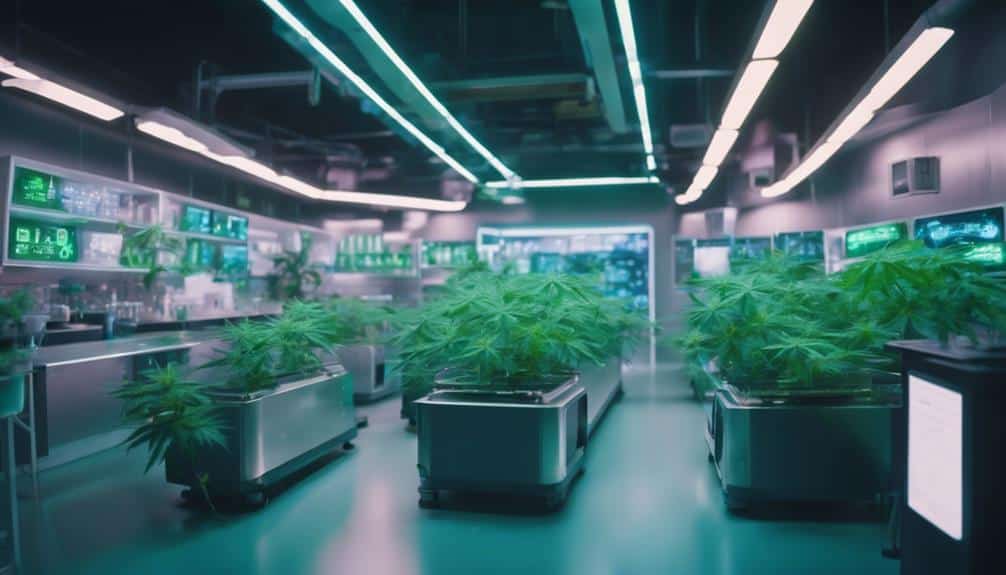Like a seedling maturing into a plant, medical marijuana dispensaries have experienced a transformative evolution over the years.
Table of Contents
You’ve witnessed the remarkable shift from their taboo origins to their acceptance as legitimate businesses.
They’ve incorporated technological advancements, reshaping their operations and how you access their services.
But what prompted this evolution and what impact has it had on our society?
More importantly, where is it headed?
We have an intriguing journey to explore, one that’s still unfolding and holds more revelations.
The Origins of Medical Marijuana Dispensaries

Digging into the roots of medical marijuana dispensaries, you’ll discover that these establishments originated in the mid-1990s. They primarily emerged in response to a growing need for safe access to cannabis for patients suffering from chronic illnesses. During this early period, dispensary regulations were virtually non-existent, creating a marketplace filled with uncertainty but also opportunities for compassionate entrepreneurs.
Patient accessibility was a critical issue. Many patients found securing a steady supply of medical cannabis challenging and often risky due to the lack of regulation. However, necessity is the mother of invention; this vacuum led to the creation of the first medical marijuana dispensaries.
These pioneering dispensaries often operated in a legal grey area driven by a mission to serve those in need. They developed innovative practices such as cultivating their own strains of cannabis to ensure quality and creating safe spaces where patients could access their medicine without fear.
As these dispensaries grew in popularity, a need for formal regulations became apparent. This led to the early dispensary regulations, which aimed to ensure patient safety and control the quality of the product. These regulations were a double-edged sword, bringing legitimacy but also increased scrutiny and operational challenges.
Legalization and Establishment of Dispensaries
As nations worldwide started recognizing the medicinal benefits of cannabis, a critical turning point came with the legalization and formal establishment of medical marijuana dispensaries. This was a landmark moment in healthcare, signifying a shift towards alternative treatment options and addressing patient accessibility to medicinal cannabis.
However, navigating the complex legal landscape posed significant challenges. Imagine the difficulties faced by those looking to establish these dispensaries:
- Compliance with strict licensing procedures
- Adherence to stringent product testing and quality assurance protocols
- Establishment of secure and transparent supply chains
These obstacles were substantial yet necessary to ensure safe and controlled distribution of medical marijuana. As a result, dispensaries could provide patients with reliable, regulated sources of medicinal cannabis.
In spite of these challenges, establishing dispensaries has been crucial in increasing patient accessibility to medical marijuana. They represent a significant step forward in accepting and applying cannabis in modern medicine; their continued evolution promises further improvements in patient care.
The Role of Technological Advancements in Dispensaries

In the realm of medical marijuana dispensaries, technological advancements have begun to play an increasingly pivotal role. They enhance both operational efficiency and patient experience. Dispensary software solutions are central to this shift, providing resources for inventory management, sales tracking, and patient records. This technology streamlines business operations, allowing you to serve your patients more efficiently.
Online ordering systems, another technological innovation, have also become essential. By enabling patients to browse products, compare prices, and place orders from their homes’ comfort, these systems improve customer service and foster patient autonomy. They also minimize waiting times and reduce crowding in dispensaries—an especially important consideration in the current context of social distancing.
Moreover, these advancements are continually evolving driven by enhancing patient experience and improving operational efficiency. As technology continues to progress, it’s clear that it will remain an integral part of the dispensary landscape. Embracing these advancements can help you stay competitive and continue serving your patients most effectively.
Cultural Impact of Marijuana Dispensaries
The rise of medical marijuana dispensaries has significantly impacted societal perceptions and attitudes. The stigma associated with dispensaries is gradually fading as community acceptance grows due to a more informed understanding of marijuana’s medical benefits.
This cultural shift is noticeable in three key areas:
- Decreased stigma: Dispensaries once seen as illicit drug outlets are now viewed as legitimate establishments providing necessary medical treatments.
- Increased acceptance: Communities are becoming more accepting of dispensaries acknowledging their role in providing alternative treatment options.
- Influence on legislation: The cultural shift has also affected law-making with more states legalizing medical marijuana.
This change is reflected in media portrayals public discourse and even new legislation. This evolution hasn’t happened overnight, but it’s clear that dispensaries are becoming a more accepted part of our societal fabric.
It’s a testament to the power of education and open conversation in shifting cultural perspectives. As you continue to serve others in this field, remember the important role you play in this ongoing transformation. The future of medical marijuana dispensaries is undoubtedly bright.
The Future of Medical Marijuana Dispensaries

Building on this cultural shift, let’s look at what lies ahead for medical marijuana dispensaries. As the industry matures dispensary franchising could become a significant trend offering well-established brands and operational models to entrepreneurs. This could spur growth enhance consistency and ensure compliance across multiple locations.
With dispensary franchising, there would also be an increase in patient education initiatives. As a dispensary owner, you’d be tasked with not only providing medical marijuana but also educating your patients about its benefits and potential risks. This education could take various forms from in-person consultations to online resources.
The future may also bring more rigorous regulations requiring dispensaries to meet high standards of quality and safety. You’d need to ensure your products are thoroughly tested and labeled accurately. These changes could be challenging but they’d also elevate the industry’s credibility.
In the coming years, technology might play a bigger role in how dispensaries operate. From sophisticated tracking systems ensuring product integrity to online platforms enhancing patient access and convenience technology could revolutionize the dispensary landscape.
In essence, the future of medical marijuana dispensaries could be marked by growth education regulation and innovation.
Conclusion
So, you’ve journeyed with us from the humble origins of medical marijuana dispensaries through their legal battles technological advances and cultural impacts. Like a phoenix rising from the ashes they’ve transformed and evolved.
As we gaze into the future there’s no doubt these dispensaries will continue to play a vital role in healthcare. Keep your eyes peeled because the future of medical marijuana dispensaries promises to be as exciting as their past.
Now it’s your turn to get involved. We encourage you to visit us at Cannabis Docs of Delaware to learn more about the ever-evolving world of medical marijuana. Our team is passionate knowledgeable and always here to assist you with any questions or concerns you might have. Don’t hesitate to give us a call.
We’re excited to welcome you into our community and be part of this incredible journey. Remember, the world of medical marijuana is as much about you as it’s about us. So come on over let’s learn and grow together!

